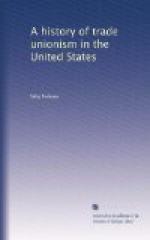The Federal eight-hour day law began to receive attention from the Federation towards the end of the eighties. By that time the status of the law of 1868 which decreed the eight-hour day on Federal government work[71] had been greatly altered. In a decision rendered in 1887 the Supreme Court held that the eight-hour day law of 1868 was merely directory to the officials of the Federal government, but did not invalidate contracts made by them not containing an eight-hour clause. To counteract this decision a special law was passed in 1888, with the support of the Federation, establishing the eight-hour day in the United States Printing Office and for letter carriers. In 1892 a new general eight-hour law was passed, which provided that eight-hours should be the length of the working day on all public works of the United States, whether directed by the government or under contract or sub-contract. Within the next few years interpretations rendered by attorney generals of the United States practically rendered the law useless.
In 1895 the Federation began to press in earnest for a satisfactory eight-hour law. In 1896 its eight-hour bill passed the House of Representatives unanimously. In the Senate it was introduced by Senator Kyle, the chairman of the committee on Education and Labor. After its introduction, however, hearings upon the bill were delayed so long that action was prevented during the long session. In the short session of 1898-1899 the bill met the cruel fate of having its introducer, Senator Kyle, submit a minority report against it. Under the circumstances no vote upon the bill could be had in the Senate. In the next Congress, 1899-1901, the eight-hour bill once more passed the House of Representatives only to be lost in the Senate by failure to come to a vote. In 1902, the bill again unanimously passed the House, but was not even reported upon by the Senate committee. In the hearings upon the eight-hour bill in that year the opposition of the National Manufacturers’ Association was first manifested. In 1904 the House Labor Committee sidetracked a similar bill by recommending that the Department of Commerce and Labor should investigate its merits. Secretary Metcalf, however, declared that the questions submitted to his Department with reference to the eight-hour bill were “well-nigh unintelligible.” In 1906 the House Labor Committee, at a very late stage in the session, reported “favorably” upon the eight-hour bill. At the same time it eliminated all chances of passage of the bill through the failure of a majority of the members of the committee to sign the “favorable” report made. This session of Congress, also, allowed a “rider” to be added to the Panama Canal bill, exempting the canal construction from the provisions of the eight-hour law. In the next two Congresses no report could be obtained from the labor committees of either House upon the general eight-hour day bill, despite the fact that President Roosevelt and later President




